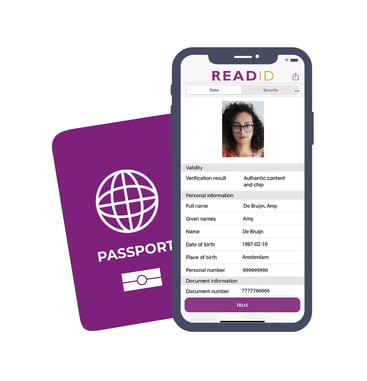First published: 21 May 2021
Last updated: 6 January 2025
What European Countries Have Identity Cards with NFC Chip?
One question we often get is which European countries have identity cards with NFC chips that ReadID can read and verify. If you have an identity card in your hand, then checking if it has an NFC chip is easy: simply look for the ICAO chip logo. This logo indicates an ICAO 9303-compliant NFC chip and can also be found on passports and residence cards. ICAO 9303 is the United Nation’s international standard for passports and identity cards.![]()
Background on Identity Cards in Europe
We focus here on identity cards in Europe, and specifically on the European Economic Area (EEA, namely EU plus Iceland, Liechtenstein, and Norway), since these all follow EU standards. Identity cards are considered travel documents, and they have a standardised lay-out, similarly to passports. But contrary to passports, the EU did not enforce usage of the ICAO 9303 standard for identity cards until 2019. As a result, in 2019 there were 86 different versions of identity cards in circulation in EU, and some countries were still issuing quite unsecure identity cards. To illustrate this latter point, the UK decided to no longer accept EU identity cards as of 1 October 2021 because of concerns raised at that time regarding the potential for fake identity cards. The EU citizens who are Withdrawal Agreement beneficiaries can still enter the UK border with their EU identity cards till at least the 31st of December 2025. There is a possibility the UK may accept only biometric EU identity cards (with ICAO-compliant NFC chips) from the 31st of December 2025. In the original ruling from 2021, the UK did not differentiate between secure identity cards with an ICAO 9303 NFC chip and unsecure identity cards, meaning this non-acceptance applied to all EU identity cards, chipped or otherwise. Ultimately, the decision on right of entry to the UK is the decision of the UK Government and the latest rules can be found at Gov.UK.
In August 2019 the EU decided to strengthen and standardise security features for identity cards from the different member states. Regulation (EU) 2019/1157 stipulates that all member states must follow the ICAO 9303 standards when issuing identity cards including an NFC chip with a face image inside.
Most European countries that introduced a new generation of identity cards already made sure that these had an ICAO compliant NFC chip, also before this new regulation. The new regulation ensures that remaining countries with older and less secure identity cards have since replaced them with more secure versions, with a few exceptions as discussed below. Member states had two years (until August 2021) to adopt the regulation and stop issuing non-compliant identity cards.
Note that the regulation does not mean that member states are obliged to issue identity cards to their citizens, only that if they do, these must be compliant. Most European countries do issue them.
Which countries have identity cards that are compatible with ReadID?
NEW: (Updated on 4 December 2024)
- Portugal started to issue electronic identity cards with NFC chips
As of the end of June 2024, except Denmark, all EEA countries issue identity cards, and all of them are with an ICAO-compliant Machine-Readable Zone. In March and June 2024, Iceland, Portugal, and Bulgaria have released their first generation of identity cards with ICAO compliant NFC chip, respectively. Therefore, by December 2024, there are 28 EEA countries released identity cards with ICAO compliant NFC chip, except Denmark and Liechtenstein. ReadID can read and verify all of them. Identity cards are normally valid for 10 years. Some countries started issuing them less than 10 years ago, so they have both the compliant and non-compliant versions in circulation. These include Spain, Italy, Belgium, and Poland.
ReadID works with all ICAO-compliant identity cards in Europe. This means that ReadID can read the contactless chip of the identity cards from 28 countries, verify their authenticity, and check for clones.
The map below shows which countries ReadID can:
- Read & verify (Dark green): ReadID can read and verify the identity cards.
- No chip (Light grey): identity cards have no (supported) contactless chip.
- No identity card (Dark grey): the country does not issue identity cards.
 Increasing Coverage
Increasing Coverage
Through the above-mentioned Regulation (EU) 2019/1157, the percentage of compatible identity cards has increased over time and will continue to do so. All EU countries which were issuing non-compliant identity cards must stop issuing them. As of June 2024, all EU countries issue identity cards with ICAO-complaint chips, except that Denmark issues no identity cards. The non-compliant identity cards in circulation will expire in the coming years, leading to an increase in compliant identity cards. We would like to mention in particular:
- Belgium, Bulgaria, Cyprus, Spain, France, Hungary, Italy, Luxembourg, Poland, Portugal, Croatia, Czechia, Estonia, Romania, Austria, Finland, Slovenia, Greece, Germany, Slovakia have ReadID compatible identity cards in circulation, but also non-compatible identity cards that have not yet expired.
- Iceland released its first ever electronic identity card in March 2024. This is the world’s first ID card with a portrait orientation, based on the additional TD1 layout specification from ICAO. It allows for a larger face image on the front side of the card. ReadID can read and verify this new card.
- Germany started to issue ICAO compliant identity cards since August 2021, which can be read and verified by ReadID. Before that, the identity cards already had an NFC chip, but not an ICAO 9303 compliant one. Therefore, ReadID cannot read those older identity cards.
- Ireland has passport cards, comparable to identity cards.
How did we create the map?
There is no authoritative source of all identity documents worldwide, and certainly not a publicly available one that contains details on the contactless chip implementation. We combined knowledge from public sources, non-public sources, our own testing data, and ReadID Analytics data to make this overview. ReadID Analytics contains anonymous logging information that we use to improve ReadID, including chip characteristics and whether an MRZ scan or NFC read was successful.
We provide this overview as-is, without any form of guarantee. We appreciate it if you let us know if you notice mistakes or outdated information via documents@inverid.com.
If you’d like access to a list of countries and some more details, then we have a summary available that you can download. We also have a more detailed whitepaper available for our customers and partners.










